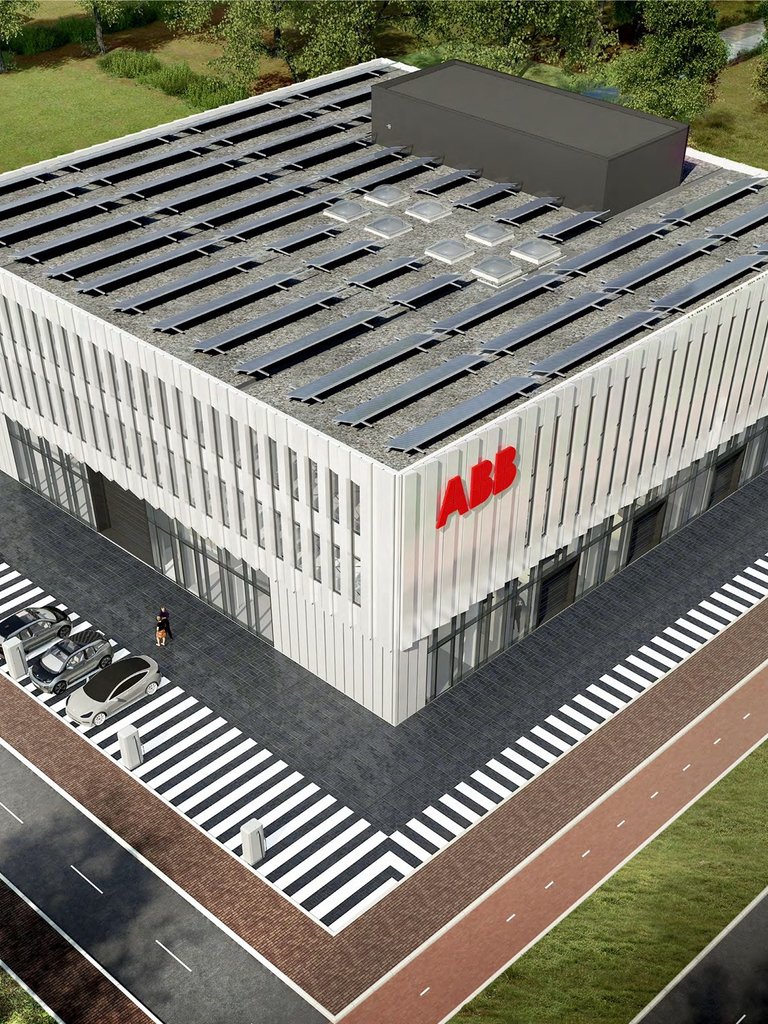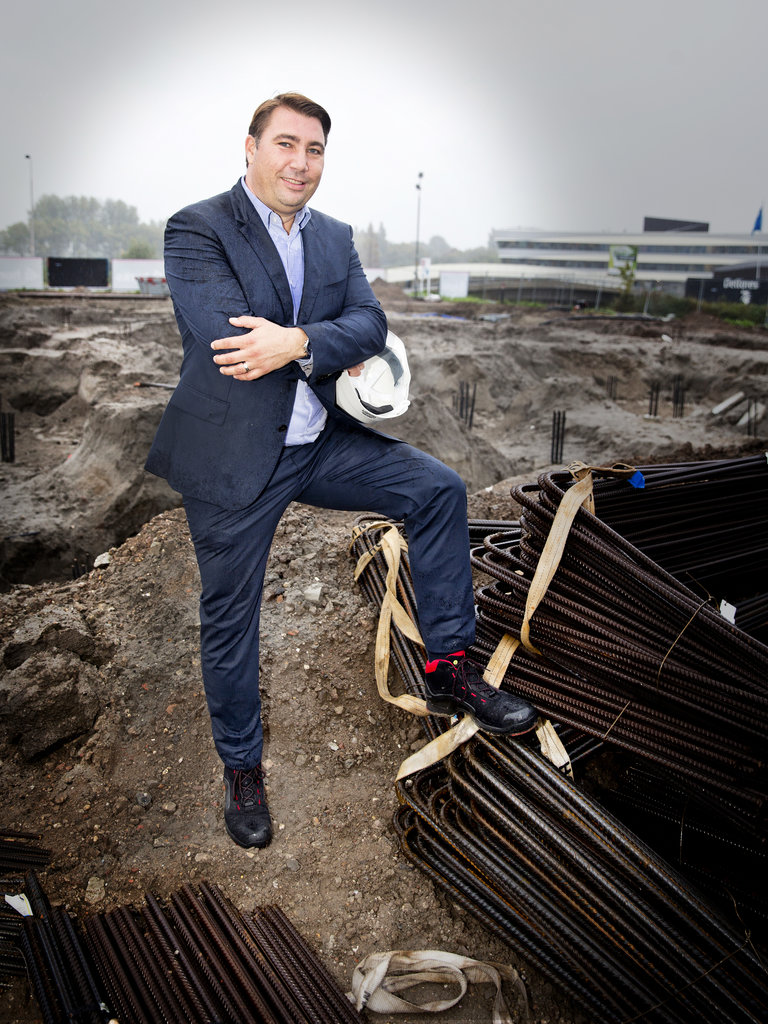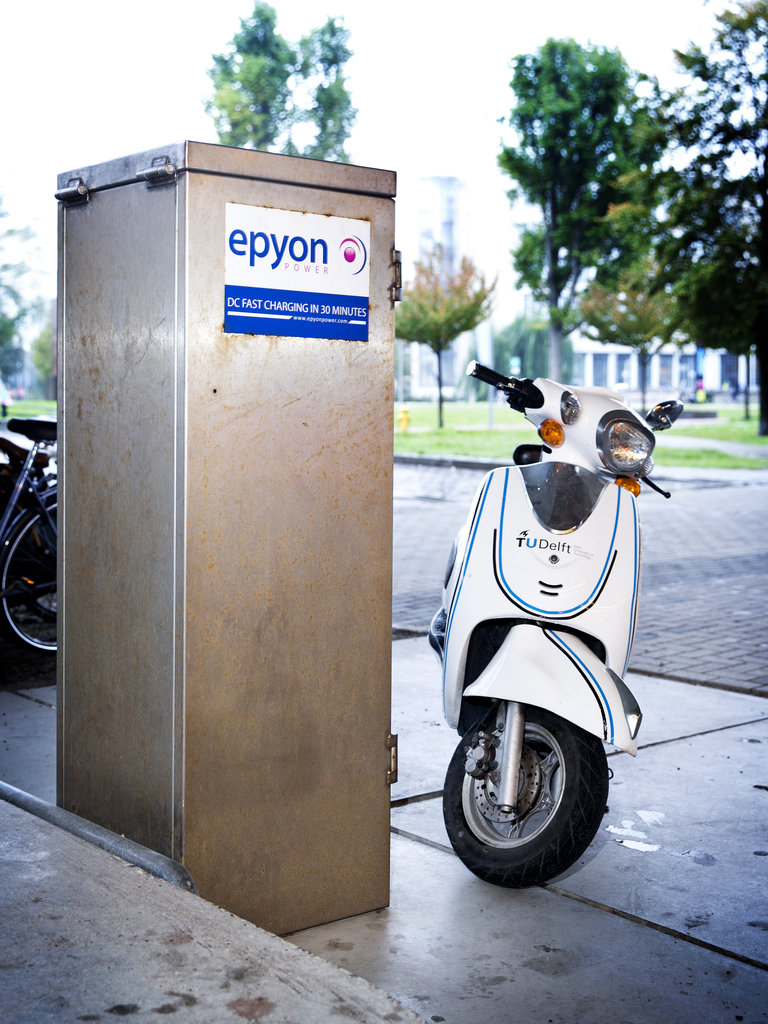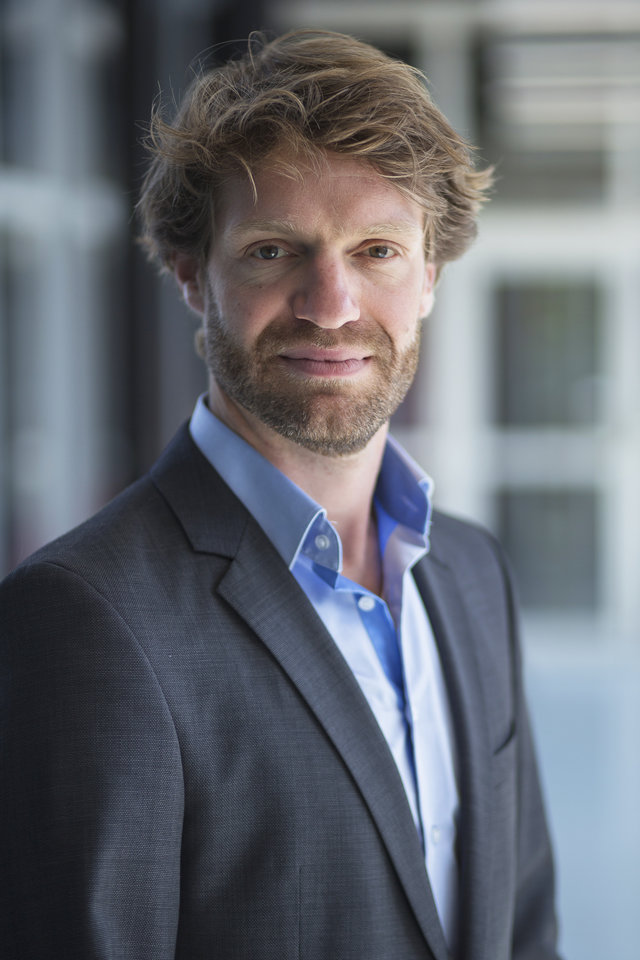
‘Big enough for a bus to drive inside’
ABB relocates its R&D for electric vehicle charging systems to TU Delft Campus
October 2nd 2018, Delft
text: Jurjen Slump
fotography: Guus Schoonewille
ABB is setting up business on the TU Delft Campus. The technology firm is having a new complex built to house its R&D for electric vehicle charging systems. The building will be fitted with ABB's latest technology, and the testing areas will be big enough for a public transport bus to drive inside. The relocation is particularly special for some employees, as they are going back to where it all started.
Before the entrance to the Aula Building stands an inconspicuous iron cabinet, surrounded by bikes. The sign on it says ‘Epyon power. DC fast charging in 30 minutes’. Its small door is closed, there's no cable sticking out. Forgotten. Unused. There is no longer anything to show that what we have here is a groundbreaking innovation: one of the first rapid charging stations in the country.
Fastned
The charging station was developed by Epyon, a start-up founded by former students of Delft University of Technology. The company was acquired by ABB in 2011 and is returning to Delft now: the multinational venture is building a complex in the southern part of the TU Delft Campus to house the headquarters and research department of its Electric Vehicle (EV) Charging Infrastructure product group.
It’s a Delft success story: Before relocating to Rijswijk, Epyon was once part of the YES!Delft business incubator programme. Its acquisition by ABB also proved a success: the rapid chargers are now sold in more than 60 countries. Dutch owners of electric and hybrid cars encounter this technology at the Fastned rapid charging stations along the motorway, for instance. The charging stations are supplied by ABB.
Public transport buses
But it's not limited to cars. ‘Buses and lorries are also on the way’, says Dennis Brouwer. He is responsible for all of ABB’s EV charging activities in the Benelux. The first public transport buses charged by ABB's systems will take to the roads of the Netherlands – in Dordrecht – at the end of the year. Electric and hybrid public transport buses in neighbouring countries (Belgium, Luxembourg) have been powered by ABB charging stations for some time now. The rising popularity of electric driving coupled with the growth of the EV Charging Infrastructure product group at ABB have made the location in Rijswijk too small. A new complex is now being built at Heertjeslaan in the southern part of the TU Delft Campus. Mainly used for R&D, it will also house the sales team and serve as the international head office of the EV Charging Infrastructure product group.

Simulators
When testing new systems, the keyword is ‘interoperability’. “We build the rapid chargers according to international standards, but everyone interprets them in a different way”, Brouwer explains. “Differences can mainly be found in the software and security protocols. We conduct extensive tests to ensure that our rapid chargers can talk to all types of vehicles.”
Simulators have been built for this purpose, so that the company does not necessarily need to have a car of every make at hand. “Ninety-five per cent of all tests can be conducted in our simulators. Our technicians work with a digital copy of the car, which is loaded into the simulator.” One thing that cannot be tested with the computer is how the systems behave in warm or cold weather. ABB has environmental rooms for this purpose, where the cars and rapid chargers are subjected to extreme conditions: temperatures of -40 to +40, high humidity – you name it.
From 50 to 300 kilowatts
Electric driving is developing rapidly. More and more major car manufacturers are coming out with fully electric cars. The number of charging stations along the motorway is growing to match. Just like the power that they supply. “Our first rapid charger, which we came out with in 2011, provided 50 kilowatts of power. Two generations later, the systems that we deliver today can supply between 150 and 300 kilowatts.”
Moreover, a motorist's needs vary depending on where he is. The charging stations along the motorway need to pack a lot of power to charge batteries in a flash, but there is less of a rush in the parking space at work or at home. “Most of the charging is done at a place where you stay put for a while. In other words, at work or at home.”
The same principle applies to public transport buses, Brouwer explains. December will see the introduction of 37 electric buses on the streets of Dordrecht. They will start with their batteries fully loaded and will recharge a little, for about five minutes each time, at the end of the line throughout the day. After the last service of the day, they will have enough juice left to make it to the depot, where they will be fully recharged in four hours.
After the last service of the day, they will have enough juice left to make it to the depot, where they will be fully recharged in four hours
Dennis Brouwer
From startup to multinational
Epyon's acquisition has proved to be a success, says Brouwer. He himself joined Epyon two weeks before the takeover, so he may officially call himself a former Epyon employee. About 15 people from the early days still work for the company. He praises the way that ABB integrated the start-up into the company. “At the beginning, ABB basically let us be, so that we could focus on the product.” The acquisition ultimately brought great benefits – and not just capital.“
They have sales departments in lots of countries, which represent all departments within ABB. That's when things really start moving”, says Brouwer. “That's scaling-up like you never imagined.” The same goes for purchasing. “ABB produces more or less everything: from power sockets to the generation of electricity and everything in between. Buying parts in bulk can be used to reduce the cost of your own product.”
At the same time, Brouwer has been doing his best to hold on to the mentality that characterised Epyon as a start-up. Because the market for electric driving is moving so quickly, his department has to be able to develop a new product in nine months’ time, which is very fast. “If you had asked me two years ago whether we'd have a 300 kilowatt charger today, my answer would have been: no, never. Now our customers are really eager to have them, even though the cars that can handle that power aren’t launched until next year.”

Sustainable building
Brouwer looks forward to moving in to the new building. Because it had to satisfy so many requirements, ABB ultimately decided on a new-build complex. No single existing building offered the necessary functionality. A powerful electrical system is being installed, and the construction of the complex will be just as robust – necessary for testing heavy vehicles. The building will be entirely sustainable: connected to the TU Delft combined heat and power plant, the roof covered with solar panels and well insulated.
Talent
Brouwer has great expectations for the new location. It's nice that Epyon once began there, but that's about it. “We have our origins in Delft – of course”, he explains. But the main reason was practical: being close to talent, for instance. He looks forward to working with internship students and strengthening the ties with TU Delft, especially in electrical engineering and industrial design engineering.
The prime location, close to the motorway, good public transport connections and the historical city within a stone's throw, also played an important role. “The plans that TU Delft has for developing the campus really appealed to us as well. We think it will be an inspiring place where young engineers and professionals will be keen to work.”
So, high time to give that Epyon charging station before the Aula Building the place that it deserves in the Science Centre and to replace it with a brand-new model from the new arrival at TU Delft Campus.
